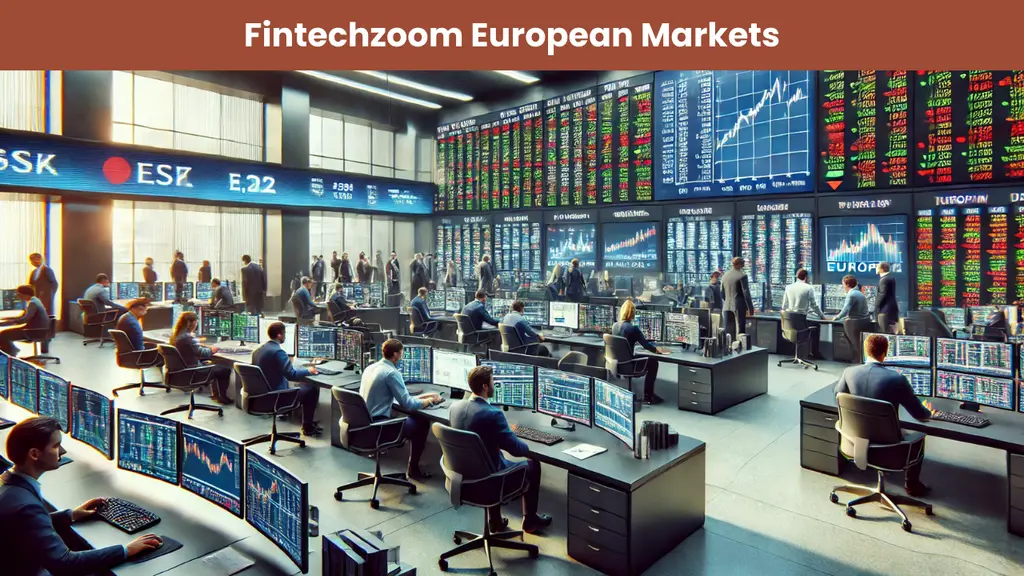Fintechzoom.com European Markets Today: Stock Movements
Fintechzoom.com European markets today’s coverage will give you the most recent stock market updates in Europe so you can make informed decisions. It shows the changes in important European indices such as the FTSE 100 and CAC 40.
The website gives the most recent data on stock prices and economic news that impacts European markets. Let’s see how you can stay ahead of market moves and better manage your portfolios with Fintechzoom.com.

What Are Financial Markets?
In financial markets, buyers and sellers can make and trade financial bonds or stock investments. They play an important role in the global economy as they help people and organizations to generate funds, invest, and manage risks. Here are 3 major types of financial markets in Europe:
- Stocks: where firms’ shares are traded.
- Bonds: where debt instruments are exchanged.
- Foreign exchange: where different types of currencies can be bought and sold.
These markets work based on supply and demand, which influences asset values and defines which asset yields the most returns. Financial markets also provide liquidity, so assets can be bought and sold quickly, resulting in good capital flow.
They also help to drive economic growth by encouraging investment in new projects and businesses. Well-functioning financial markets are needed for economic stability because they connect people seeking finances with those prepared to invest or lend.
Fintechzoom.com European Markets Today

Here is the live results for European Markets on Fintechzoom.com Today:
European Markets Today
As of March 17, 2025, the European Central Bank (ECB) has implemented multiple interest rate cuts since mid-2024, reducing the deposit facility rate from 4% to 3%. This series of reductions aims to address declining inflation and support economic growth within the eurozone.
Looking ahead, the ECB is anticipated to continue its rate-cutting cycle throughout 2025. Analysts project that the deposit facility rate could decrease by an additional 100 basis points, potentially reaching 2% by mid-2025. These cuts are expected to occur in 25-basis-point increments during the ECB’s monetary policy meetings in the first half of the year.
This anticipated monetary easing is supported by a subdued growth outlook and ongoing inflationary risks, including potential trade tensions and fiscal policy changes. The ECB’s approach remains data-dependent, with a focus on balancing the need to stimulate economic activity while maintaining price stability.
Key European Stock Market Indices Covered by Fintechzoom.com
As discussed above, Fintechzoom is a website that monitors the performance of major European stock market indices and gives important information to investors.
These indices show the largest and most important corporations in their respective countries. Here are some key European stock market indices covered by Fintechzoom:
FTSE 100 (UK)
The FTSE 100 indexes the top 100 companies listed on the London Stock Exchange. It covers many different industries, such as finance, energy, and consumer products. The index is a reliable indicator of the UK’s economic health. Investors regularly monitor it to assess the overall performance of British companies in worldwide markets.
DAX (Germany)
The DAX index measures the top 40 companies listed on the Frankfurt Stock Exchange, which represent Germany’s most important businesses. These include key businesses like automobiles, medicine, and technology. Since Germany is Europe’s largest economy, this indicator is important for understanding the overall European market trends.
CAC 40 (France)
The CAC 40 comprises 40 Euronext Paris exchange’s largest publicly traded companies. Its industries include luxury goods, oil, and finance, so it is a key indicator of France’s economy. Investors use the CAC 40 to monitor market changes in one of Europe’s main economies.
AEX (Netherlands)
The AEX tracks the top 25 companies on the Euronext Amsterdam exchange. It includes companies from many industries, such as energy, technology, and financial services. All these companies show the progress of the Dutch economy. This indicator is closely observed for information about the Dutch economy and its integration into the larger European market.
Ibex 35 (Spain)
Lastly, the IBEX 35 is Spain’s benchmark stock market index, which contains 35 of the most liquid stocks on the Madrid Stock Exchange. It has important companies like telecommunications, finance, and infrastructure. Spain is one of Europe’s largest economies, so this index allows investors to monitor the country’s financial health and business environment.
Impact of European Economic News on Markets

European economic news greatly impacts stock markets since it directly influences investor confidence and asset values. Economic growth and employment-related announcements can all cause fast market reactions. Positive news, such as increased GDP or decreasing unemployment rates, can boost investor confidence and increase stock prices.
On the other hand, negative news such as economic slowdowns or negative trade policies can lead to market volatility and falls. Events like Brexit and elections can also disrupt markets by creating uncertainty about future policies and regulations.
Furthermore, changes in European Central Bank policy, such as interest rate adjustments or stimulus programs, can also affect market movements and total economic activity across the continent.
Who Are the Key Players in the European Financial Market?
The European financial market comprises many participants who play a specific role in the whole system. Some of these key participants are:
Investors
Investors are people who invest money in financial assets such as stocks or commodities to increase their wealth. You can be a retail investor or an institutional investor, such as a pension fund or hedge fund. Your purchasing and selling activities have a big impact on asset values and market trends.
Banks and Financial Institutions
Banks serve as financial market agents who facilitate capital movement through loans and investment services. Investment banks are an example of this, as they assist corporations in raising money by issuing stocks and bonds. On the other hand, commercial banks provide savings and lending services to people and businesses.
Governments and Central Banks
Governments engage in the financial market by issuing bonds to fund projects and expenses. Central banks such as the European Central Bank and the Federal Reserve have important roles in interest rates and stabilizing the financial system. Their policies and interventions considerably impact market liquidity and investor behavior.
Brokers and Exchanges
Brokers are the middlemen between buyers and sellers who complete trades on investors’ behalf. Stock exchanges such as the New York Stock Exchange (NYSE) and the London Stock Exchange (LSE) are platforms for buying and selling financial assets and brokers help with that. These exchanges support transparent and regulated trading.
Regulatory Bodies
Financial markets law is supervised by regulatory organizations, such as the Securities and Exchange Commission (SEC) in the United States. These organizations implement rules and regulations to promote fair trade and preserve market integrity.
Each of the points above contributes to the overall functioning of the financial market by facilitating asset exchange and economic growth.
How Investors Can Use Fintechzoom for Better Decision-Making
Investors can improve their decision-making process using the tools and information accessible on Fintechzoom. The platform provides real-time financial data, such as stock prices and market movements.
Fintechzoom also provides advanced charting and analytical tools to check past performance and predict future trends. These tools facilitate technical analysis, which can help investors decide when to purchase or retain assets.
Comparison of European Markets With Global Markets

Although European markets play an important role in the global financial world, they differ from other markets. Here’s how:
Market Size and Influence
European markets like the FTSE 100 and CAC 40 account for a sizable percentage of global economic activity. However, the US market like the S&P 500 and Nasdaq dominates in terms of market capitalization and liquidity. Their scale and the presence of many prominent technology businesses puts US markets in a spot to create worldwide trends.
Economic Indicators
European markets are influenced by many economic factors, such as monetary policy from the European Central Bank (ECB) and European Union trade agreements. Global markets like the United States and Asia are influenced by many factors, such as Federal Reserve interest rate decisions and geopolitical developments. Investors must consider regional differences in economic data when making investment decisions.
Investor Behavior
European investors are more conservative than their American counterparts, who choose higher-risk investments, particularly in technology and growth stocks. This difference in risk can impact market volatility, with European markets less prone to big fluctuations.
Conclusion
Fintechzoom.com European markets today related news are available on its online portal. It gives real-time updates on big stock indices and market movements so investors can make good investing decisions. You can also get information on how European markets perform by staying updated on indices such as the FTSE 100 and DAX.
FAQs
Investors should always monitor GDP growth, inflation, and industrial output. These indicators will give information about the health of the European economy.
Yes, Fintechzoom offers articles and guidebooks to help clients understand the newest market trends and investment techniques according to their different degrees of investment knowledge.
The region will grow with the European Union’s promise to achieve carbon neutrality by 2050 and considerable investments in innovation. This will attract more investors, and the European market will face a brighter future.
